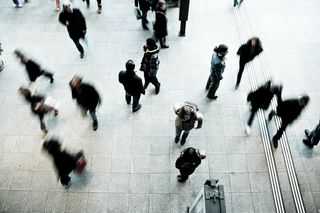Coronavirus Disease 2019
Overcoming Psychological Obstacles to Beating Coronavirus
The battle against the virus starts with battling our natures.
Posted March 19, 2020 Reviewed by Kaja Perina

February 2004, riding in the back seat of an up-armored SUV on the “highway of death” from Baghdad airport to the Iraqi capital, I had a strange epiphany about the mortal danger I faced that morning.
Yes, a roadside bomb might get me, or possibly a grenade dropped from an overpass, or small arms fire, or some combination of those threats. The high incidence of attacks on the airport road were, after all, what had earned that route the “highway of death” moniker in the first place.
But what I realized that morning was that my greatest peril didn’t come from an attack per se, but from the soldiers who accompanied me in the SUV.
Deployed there almost 11 months, the soldiers had been up and down the road we were traveling dozens of times, so to them, the morning excursion was routine, no big deal. Although all of the soldiers knew people who’d been attacked—even killed—in convoys like the one we were in, none of them had ever been attacked themselves.
Thus, as we headed into the city, instead of staying alert, the soldiers chit-chatted about sports, food in the dining facility, video games, politics and other “normal” topics of conversation, because to the soldiers, the situation we were in at that moment was “normal.”
But the situation wasn’t normal to me because I only went to Iraq a few weeks at a time every six months or so, and I was nervous as hell.
Ten minutes into the ride I spoke up. “Sorry, but I’m going to insist that you all stop talking and keep eyes out for contacts (threats) and unusual activity—like kids not playing soccer where they usually do.”
Since I was the senior person in the vehicle, the soldiers had to pay attention to me, but their sullen looks and eye-rolls as they quieted down and turned their attention to our surroundings told me they thought I was being a killjoy, a pansy, a weenie.
In one sense, the soldiers were right, because we got to the Green zone 20 minutes later unscathed. But in another sense, their complacency was misplaced, because they had fallen prey to what Israeli psychologists Haim Omer and Nahma Alon of Tel Aviv University call “the normalcy bias.”
The normalcy bias, simply put, is people’s tendency to discount the risks of a pending or developing disaster because they interpret their current situation as a continuation of normal life.
Most of us fall prey to this bias when “abnormal” events occur, attributing the sounds of real gunfire to firecrackers, or signs of workplace violence to a practical joke. In Iraq, I confess to experiencing the normalcy bias myself the first time I saw gunfire directed at me, automatically assuming at first that the blinking orange lights were—get this—Halloween decorations!
And like me, and the soldiers in the SUV that morning, an enormous number of Americans are laboring under the normalcy bias right now as we face the coronavirus, resisting a full lockdown out of a belief that the threat does not diverge enough from “normal” cold and flu season to warrant extreme measures.
Many of my acquaintances, together with several talking heads on TV and a prominent governor or two, have downplayed the threat of the virus, lamenting that our reaction to the virus will do more harm—through economic damage—than the virus itself.
While we don’t yet know the full measure of the looming threat, experience in China, Italy, and Iran suggest our situation in America is far from normal.
Dr. Chris Gilbert, who wrote "Is the Coronavirus in China Identical to the One in the U.S.?" and who has carefully monitored global coronavirus statistics, said recently: “The lessons from China are simple: infections will peak two or three weeks after a full lockdown, then steadily decline. But with no lockdown, infections will continue to spike exponentially.”
So here’s my point: All of us are basically in the position I was in that morning in 2004, speeding towards a possibly catastrophic event, where others in the vehicle may not take needed action out of an implicit belief that everything is “normal.”
This normalcy bias may make it very difficult for our leaders to do the right thing, because many voters, who keep these leaders in office, will think the leader is panicking when they order a lockdown. And when the lockdown works, and the threat passes with minimal casualties, those same voters will say, “See, I told you it was no big deal. We destroyed our economy for no good reason.”
Politicians are acutely aware of this diabolical paradox: Forcing a lockdown will work, but precisely because it will work to keep the disease in check, many voters won’t see the feared, enormous impact from the virus, and blame the politicians for overreacting.
In an election year, I fear that many politicians will respond to what they believe voters want and not to what voters need.
And what we all need is to accept that our current situation is far from normal, and that abnormal steps are needed.
Bottom line: If each of us doesn’t embrace the radical departure from normalcy that we find ourselves in—and vocally support a lockdown—most of our politicians surely won’t either.
References
https://io9.gizmodo.com/the-frozen-calm-of-normalcy-bias-486764924
Omer, Haim Omer and Alon, Nahma The continuity principle: A unified approach to disaster and trauma". American Journal of Community Psychology. 22 (2): 273–287.




